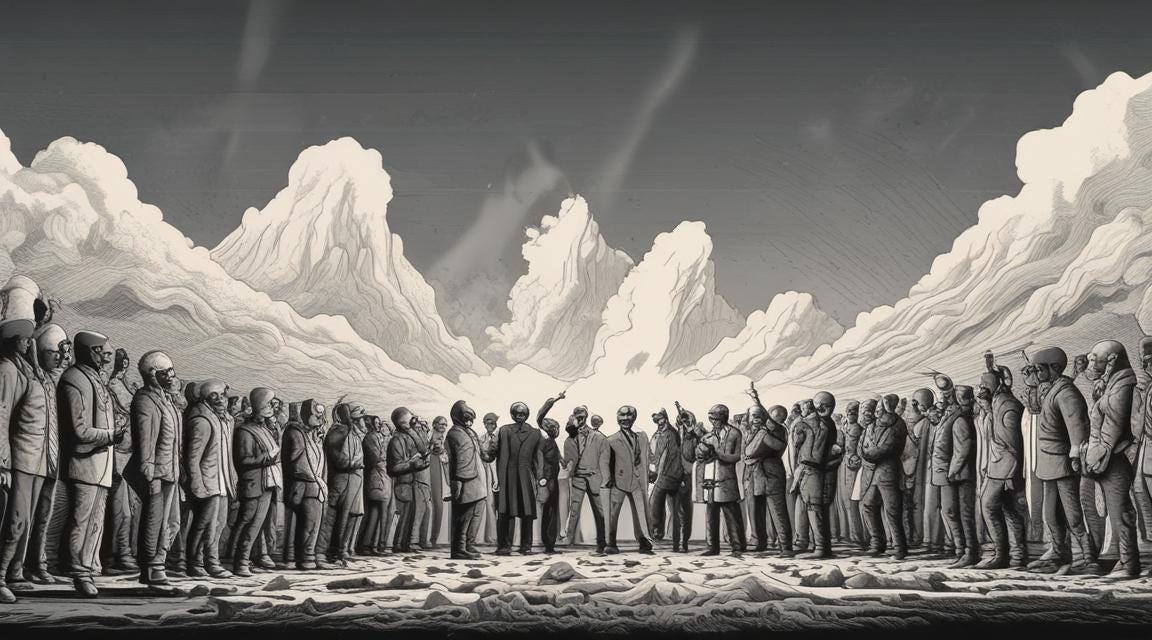Have you noticed the frequency with which any challenge to the Political Establishment’s values is characterized as far right and invariably populist?
There is an Unholy Alliance of Western Leaders – Prime Minister Keir Starmer, French President Emanuel Macron, German Chancellor Olaf Scholtz – whose hatred of what they call populism is undisguised. In his recent visits to Berlin and Paris, Starmer constantly referred to the threat posed by populism. During his meeting with Scholz in Berlin on 28 August, Starmer spoke about the importance of defeating “the snake oil of populism and nationalism”[i]. He explained that as far as he was concerned, populism was a threat to the power of the technocratic elites throughout Europe.
Speaking in Paris a day later, Starmer pointed to the far right as a ‘very real threat’ and again used the term the ‘snake oil’ of populism[ii].
Starmer has never stopped talking about the ‘snake oil of populism’. These days virtually every political problem is blamed on populism. After the recent riots in Britain, Starmer went so far as to hold the Conservative Party responsible for this violent event on the ground that the previous government had been soft on the populists He stated:
‘Every time they ..[the Conservatives]..faced a difficult problem, they failed to be honest. They offered the snake oil of populism which offered more failure, round and round and round.[iii]
The coupling of the term snake-oil with populism is constantly used in the propaganda of the technocratic political elite. Indeed, tackling and discrediting snake oil populists is its number one priority. Even in his King’s speech, Starmer noted that his politics represented ‘a rejection, in this complicated and volatile world, of those who can only offer the easy answer – the snake-oil charm of populism’.
The media supporters of the anti-populist oligarchy serve as an echo chamber for their master’s voice. ‘Sooner or later, the snake-oil charm of Nigel Farage and Reform will have to be tackled head-on – especially if Trump returns to the White House’ argued The Guardian commentator, John Harris back in July[iv].
So what is the source of the elite’s anti-populist hysteria? The answer is that they know that they are out of touch with the aspiration of the public and that it is only a matter of time before they are seriously challenged by some form of populist movement. As Harris pointed out:
‘In the midst of Starmer’s political honeymoon, it is an unfashionable point to make, but our national condition is still largely defined by a populist success Labour is still unable to contest: Brexit, arguably the greatest triumph for the new right anywhere in the democratic world. On 4 July, moreover, more than 4 million people voted for Reform UK, which put it well ahead of the revived Liberal Democrats as the UK’s de facto third party, only denied that status because of our absurd electoral system’.
Virtually the same point can be made about the challenge posed by populist parties in France or Germany. It is thanks to an ‘absurd’ electoral system that that the influence of populist parties can be seriously diminished.
The aim of the constant stream of abuse directed at populism is to pathologize movements whose values are often antithetical to that of the cultural and political Establishment. Almost every movement that has rejected this Establishment has been dismissed by those immersed in the technocrats’ universe as a variant of the same malaise – ‘populism’.
The hysterical propaganda directed at populism has been relatively successful. Even many right -wing commentators regard populism as a negative phenomenon. The association of populism with snake-oil charm suggests that it is an essentially dishonest enterprise. Populism is cast into the role of a morally inferior phenomenon whose voice cannot be believed and whose promises cannot be taken seriously. According to the anti-populist narrative, populism is the pathology of the simple-minded masses, those who are apparently predisposed towards authoritarian, xenophobic and anti-democratic sentiments. They are what Hillary Clinton called the ‘deplorables’.
Their consciously distorted version of populism has nothing to do with the views and passions of the people they decry. Capturing the meaning of 21st-century populism is difficult, because the use of the word ‘populist’ has been so heavily influenced by the anti-populist temper that dominates public language.
In the past, populism was a form of self-designation – people knowingly described themselves as populist. During the 19th century, the agrarian radicals, the Narodniks in Russia, like the People’s Party in the US, took pride in their populist outlook. In the 20th century populism was often viewed neutrally and even positively by commentators. However, in the 21st century, it is the advocates of anti-populism who get to define their opponents as populist. The political scientist Ivan Krastev raised an important question when he asked, ‘Who decides which policies are “populist” and which are “sound”?’ (1). The answer: an influential coterie of anti-populists.
Anti-populist hysteria plays an important role in the contemporary Culture Wars. Why? Because movements designated as populists are not simply hostile to the policies of their opponents but also to the cultural values of the elites. It is this direct challenge to values represented as mandatory by the dominant institutions of society that anti-populist commentators find so hard to accept. As the political theorist Margaret Canovan pointed out, unlike other social movements, populism does not merely challenge the holder of power but also ‘elite values’. So, its hostility is also directed at ‘opinion-formers and the media’.
In effect the values espoused by populist movement offer an alternative to the political culture of the elites. It just so happens that of the values of populism resonate with many people in society. The current debate on mass migration is a case in point. The reason why populist parties who demand an end to mass migration are called racists and xenophobes is because their opponents are not prepared to take on their arguments. It is easier to demonise them as ‘far right’ than to engage with the arguments.
Don’t worry about the supposed snake-oil charm of populism – beware of the charmless fraudsters who are attempting to shut down public discussion through a variety of legal instruments such as laws against hate speech, disinformation etc.
Just remember that the current ideological assault on populism serve as a roundabout way of attacking democracy. This carefully cultivated hysteria may well serve as a prelude to authoritarian measures directed at free speech and the freedom of assembly. Watch this space!
[i] https://www.msn.com/en-ie/news/uknews/delivery-key-to-tackling-snake-oil-of-populism-across-europe-says-starmer/ar-AA1pByxA
https://www.bbc.com/news/articles/crkm8mg4md4o
[iii] https://www.gbnews.com/politics/keir-starmer-blames-tories-riots-populism-violence
[iv] https://www.theguardian.com/commentisfree/article/2024/jul/22/populism-britain-problems-labour-nigel-farage-reform-donald-trump






Society's self-regarding, self-congratulatory elites that continually emphasise their status with luxury beliefs, will become more authoritarian as living standards fail to improve. The state will try and inhibit expressions of dissent (over immigration and the dilution of British culture through multiculturalism} by increased regulation and lawfare. Requiring police to pursue 'legal but harmful' behaviour online is the latest example no matter that it was a disaster in Scotland.
If there was an economic boom then the population woud ignore the elites more; if the justice system was not broken, if fair and equal treatment was actually a reality then the police would not be overwhelmed by policing thought and its expression as happened in Scotland and will happen in England and Wales.
Technology such as facial recognition, the forthcoming digital currency and monitoring of social media permit increased surveillance and may work for a while to keep the lid on increasing disatisfaction with Britian turning into a failed state. A Chinese social credit system seems inevitable in the longer term.
Meanwhile, demographic projection suggests Britain will be a muslim majority country by 2070. Plenty of time to study the hadiths as we will need knoweldge of them to argue a case in the sharia courts that will replace over a thousand years of English common law.
I just wish, when looking for where to emigrate to, that Hungarian or Polish were easier to learn.
As usually, great points! Good idea to provide a history of populism. Of course, as long as the technocratic and media elites are those who define, or rather, redefine language, populism is seen as "far right" and negative. But there is a populism of the left also, which is never defined as such. After all, what is "diversity, equity and inclusion" if not populism? Isn't populist to claim that everybody should have the same outcome?